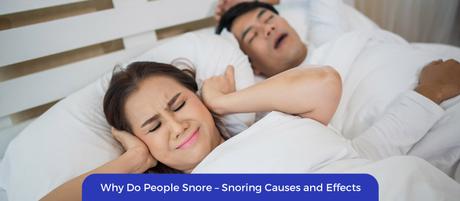Why do people snore? What makes people snore and what does it mean when you do? Before discussing the factors that cause people to snore and how to overcome them let's first have a look at how big this issue is. How common is it, and what are the major snoring causes and effects?

Snoring is a serious issue for many people, particularly for couples where one partner snores and keeps the other awake for a large part of the night. The two biggest causes for divorce in the USA and UK are infidelity and financial issues. Guess what the third is! You got it - snoring! Snoring is very common and a Sleep Cycle study reported that 52% of American women are wakened up by a snoring partner, and 40% of women worldwide would prefer to sleep alone than with their partner. Men have a similar problem - but they probably aren't allowed to complain so much!
In fact, research in the USA has also concluded that around 40% of adult men snore habitually, compared to just 24% of adult women. But it's not just adults that snore - your children may also habitually snore. It has been reported in the Scientific American that researchers have concluded that 20% of normal children snore now and again, and 7% - 10% snore every night.
Table of Contents
Causes of Snoring
Here are some snoring causes and effects. The main cause of snoring is that the throat relaxes when you sleep, sometimes relaxing so much that the airway is partially blocked. This can lead to vibration of the soft tissues at the back of the throat, and in many cases of the back of the tongue, which generates the sound of snoring.
Sleeping Position: Your sleeping position is also often the cause. Back sleepers tend to snore more than side or stomach sleepers. If you are a habitual snorer, try sleeping on your side. When you sleep on your side there is less compression of your airways. You could try sleeping on your stomach, but this is not the best of sleeping positions, particularly if you have a soft mattress. If you snore no matter what position you sleep in, you may have to visit your doctor.
Some people tend to roll over onto their back after falling asleep, irrespective of their preferred sleeping position. This can lead to snoring. One solution for this is to tape a tennis ball to your back. If you roll over onto your back when sleeping, the discomfort this causes you will force you to roll off your back onto your side or stomach.
Sleep Apnea: Sleep apnea, where you stop breathing for a short time while sleeping, can also lead to snoring. Studies have shown obstructive sleep apnea to be the cause of snoring by 4% of men and 2% of women who snore and also of about 1% of snoring by children. This is characterized by repeated pauses in breathing during sleep, labored breathing, and snoring. The breathing pauses are generally due to obstruction of the airway or even complete blockage. It usually leads the person waking up for a short time, which relieves the obstruction but leads to poor quality sleep and excessive tiredness during the day. Sleep apnea is rarer in side sleepers than back sleepers. If you believe you may have sleep apnea then you should consult your physician.
These are two of the major reasons for snoring, but there are others. The sleepapnea.org website provides lots of information regarding sleep health and sleep apnea, and on the effect of snoring on the snorer's partner. Here are some of the other reasons for snoring.
Weight: Heavier weight people tend to have more snoring problems than leaner people. This is because the heavier people often have extra tissue and fatty deposits around the area of the throat. When they relax when sleeping, particularly when sleeping on their back, these tissues tend to drop and restrict the airway, leading to snoring. If you snore and are overweight, then losing a few pounds will likely help.
Drinking Alcohol: Alcohol can relax your throat muscles, partially blocking your airway. This makes you more likely to snore. Many people think they sleep better after a few cocktails or whiskeys, and they may do - but they are also more likely to snore.
Smoking: Smokers tend to snore more than non-smokers. This is because the smoke tends to dry your lungs and the chemicals in the smoke can irritate your airway and lead to a narrowing of the airways in the nose and throat.
Medications: Sleeping pills and prescription relaxants can lead to your throat muscles relaxing and constricting your airway. Sleeping pills are likely to prevent you from awakening due to the noise of your snoring.
Aging: Getting older can give rise to several medical issues and snoring is one of them. As you age, your soft tissues become less elastic and tend to become drier as they lose moisture. This can also lead to snoring.
Colds and Nasal Issues: If you have a blocked or partially blocked nose or sinus problems, then you could find it difficult to breathe properly. It's not something you can control when sleeping, and you will tend to snore.
These are all common reasons for snoring. Unfortunately, you cannot switch snoring off or on because it is an involuntary issue that occurs when you are sleeping. Partners often quite forcefully tell their other half to stop snoring, but they can't unless you wake them up. Then they start snoring again when they fall asleep again. Snoring is involuntary, and snorers cannot turn it off or on at will!

What Does it Mean When You Snore?
These are the more common reasons why people snore. But what does it mean when you snore? The noise of snoring is caused by vibrations of the tissues in your throat, but why does it happen. Can the way you snore give any clues as to why you are doing it? Here are some forms of snoring and the reasons why. We also suggest how you can help prevent each type of snoring or at least reduce its volume.
Open Mouth Snoring: If you snore with your mouth open then it means that your throat muscles may be too weak to prevent them from vibrating when he breaths during the night. There are devices available, similar to sports mouth guards, that can help to reduce or even eliminate this type of snoring. However, you can snore even if your mouth is closed.
Closed Mouth Snoring: If you snore with your mouth closed, then it means that your tongue that is causing the blockage. Your tongue falls back when you sleep, and the closer it falls back towards your throat the more likely you are to snore. Try it yourself: breathe normally, then pull the back of your tongue back towards the back of your throat. You will yourself snoring! There are mouthpieces available that can prevent your tongue from falling back towards your throat and so preventing this type of snoring.
Solutions to Snoring
There are two major ways to help cure snoring - physical and surgical. Physical methods involve the use of physical devices while surgical snoring cures involve the use of surgery or surgical implantations to prevent or reduce the volume of your snoring.
Surgical Solutions to Snoring
If you snore irrespective of your sleeping position, then you may require specialist treatment. You might also need surgery and you should visit your physician to ensure that 1) You have no underlying medical condition that could have caused it, and 2) whether or not you need any of the medical options available to you. Here are four of the surgical methods that can be used:
Surgery: Inflamed tonsils can be the cause of your snoring. You would likely feel pain at the back of your throat if you had tonsillitis. There alternative treatments for this, the most effective being the removal of your tonsils. This was a standard procedure back in the 1950s and 60s, particularly with children aged around 8 to 16.
Somnoplasty: In many cases, the tissue partially blocking your throat is excess to your needs, and can be removed. This removes the obstruction that is causing the snoring. It is a half-hour procedure under local anesthetic using radiofrequency heat. You will remain awake during the procedure and will feel no pain - but your snoring may be eliminated or at least significantly reduced.
LAUP (Laser-Assisted Uvulopalatoplasty): A laser is used to shorten your uvula, the dangling piece of flesh at the entrance to your throat. It prevents food from entering the back of your nose and also generates saliva that lubricates the throat. If your uvula is too long it can vibrate when you are breathing when sleeping and lead to snoring. Shortening it can cure one cause of snoring. A medical examination can indicate whether or not this may be the cause of your snoring. After the procedure has healed the uvula will be stronger and less likely to vibrate.
Soft Palate Support: If you reach your tongue back into the top of your mouth past the hard palate, you will soft tissue. This can vibrate when you sleep, causing snoring noises, and an implant can keep it supported and prevent it from vibrating.
Physical Solutions to Snoring
Physical solutions to snoring involve the use of devices to help prevent the vibrations in your throat and mouth that are the case of the problem. Sleep apnea requires specific treatment and a continuous stream of air passing through to your lungs.
CPAP Machines: Most doctors will suggest a continuous positive airway pressure (CPAP) machine for this. A motor pumps air through a mask, forcing air into your airways and prevents snoring. The fact that you must wear a mask over your face during this process often deters some people from using it. However, they have optional means of preventing snoring, depending on the cause. Among these are:
Mandibular Advancement Devices: This type of device was alluded to in our section above on open mouth snoring. It's a bit like a mouth guard but is hinged to force your jaw forward which not only strengthens your throat muscles but also helps to prevent the airways from closing and causing snoring.
Tongue Retaining Mouthpiece: This is a device that you can wear in your mouth. It keeps your tongue in the ideal position to prevent snoring and is ideal for closed-mouth snorers whose snoring originates from their tongue.
Home Remedies For Snoring
Many people would prefer not to approach a doctor or physician with their snoring. Many feel embarrassed while others may not wish to undergo medical procedures. As with several common conditions, some may prefer to try home remedies first before seeking the advice of a physician. There are few home remedies for snoring, but those that are used can be effective if used correctly.
If you feel that your snoring might be due to congestion of your airways, such as nasal congestion, then home remedies can sometimes be successful. Properly designed strips for your nasal passage can raise the muscles of your nose to open up the nasal passage and permit more air to flow to the back of your throat. Some people snore because their nose becomes congested while they sleep. A decongestant can cure this problem, particularly in some cases, a natural decongestant, although some find menthol effective. There are others available from pharmacies.
You will find it easier to breathe if your head and upper body are in an elevated position. You can prop yourself up with pillows or a wedge pillow, although many people find that an adjustable bed helps them. You can adjust the height of your head and neck in relation to your back and chest. Some people find that certain types of mattresses are of help. You can find our recommended mattresses for snoring here.
Benefits of Stopping Snoring
There are several benefits to stop snoring. The most obvious is that you will be less likely to keep your partner awake at night. You may also get a more restful sleep yourself, preventing continual tiredness throughout the day. Many couples end up with divorce because of the continual snoring of one partner. Before it comes to that, many decide to sleep in separate rooms!
Snoring FAQs
Here are some questions we are often asked by our visitors:

Why Do People Snore: Conclusion
There are several reasons why people snore. There could be a medical reason such as sleep apnea, or a physical reason such as the airway being obstructed in some way. However, there are ways to help prevent such incidents and we have explained the most common of these. All those we have described do work well in practice, though much depends on why people snore.
By establishing the snoring causes and effects in individual cases, it should be possible to take appropriate action to prevent snoring. According to the Guinness Book of World Records, the loudest snore recorded was measured to be 111.6 decibels. This is greater than the noise generated by a hairdryer, snow blower, or a tractor. It is close to the 112 decibels maximum output of some MP3 players, rock concerts, and chainsaws.

